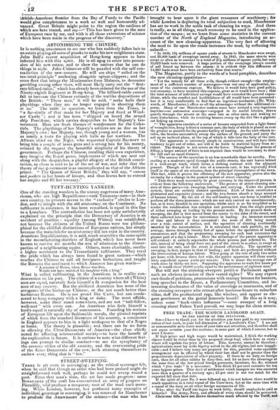TUFT-HUNTING YANKEES.
One of the standing wonders is, the uneasy eagerness of many Ame- ricans, who are high Republicans—rank Tammany-men—in their own country, to procure access to the "exclusive" circles in Lon- don, and to mingle with the old aristocracy on the Continent. No tufthunter in existence, it has been remarked, is equal in this line to a Locofoco. The contradiction has been not quite satisfactorily explained on the principle that the Democracy of America is an accident of position : equality (among Whites) was established, not because the citizens of the United States were too philoso- phical for the childish distinctions of European nations, but simply because the materials for an aristocracy did not exist in the country. American Republicanism, it is said, much resembles the same spirit in the manufacturing-districts of England, which has never been known to survive six months the sera of admission to the dinner- parties of a neighbouring squire. Others, more charitable, ascribe a higher sentiment to the Transatlantic tufthunter. They recal the pride which has always been found in great nations—which teaches the Chinese to call all foreigners barbarians, and taught the Romans the sentiment to which ADDISON has given words- " A senator of Rome, when Rome was free,
Would not have matched his daughter with a king."
What is called tufthunting, in the American, is in reality con- descension on his part. The citizen of a country where all (White) men are equal, naturally feels himself a fit companion for the best men of any country. But the civilized American has none of the arrogance of the barbarous Chinese, or the not much better than barbarous Roman. He is not proud like CATO, but can conde- scend to keep company with a king or duke. The most affable, however, make their stand somewhere, and are not "hail-fellow, well-met " with every one. An American who feels himself a lord's equal is naturally shy of commoners. Founding his notions of European life upon the fashionable novels, the pirated reprints of which form the standard literature of his country, a commoner in England appears to him in a light analogous to that of a Negro at home. The theory is plausible; and there can be no harm in allowing the Ultra-Democrats of America—the class chiefly noted for affecting aristocratical society—to have the benefit of the explanation in future. It is curious to note what different feel- ings can prompt to similar conduct—to see the sycophancy of the noreaux riches of the old country, and the overweening pride of the fierce Democrats of the new, both straining themselves to eschew every thing that is " low."






























 Previous page
Previous page